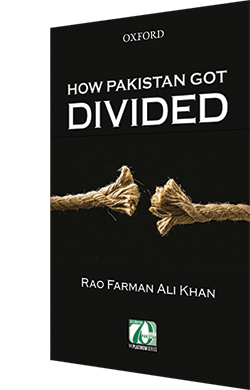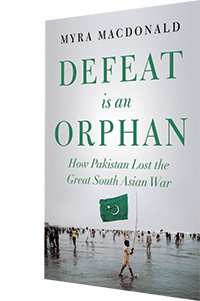How Pakistan got divided, Rao Farman Ali Khan, OXFORD university press; Rs.1,150, Pages 298
 Rao Farman Ali Khan’s book under review is of interest because, as the Pakistani newspaper Dawn noted when he died in January 2004, he had been a “key player in the East Pakistan crisis”.
Rao Farman Ali Khan’s book under review is of interest because, as the Pakistani newspaper Dawn noted when he died in January 2004, he had been a “key player in the East Pakistan crisis”.
Commissioned in the Artillery regiment in 1942, Rao Farman Ali Khan served many years in East Pakistan (now Bangladesh). As military adviser to the governor of East Pakistan in 1971, he had complete knowledge of the events leading to the fall of Dhaka. That comes through in the 17 chapters of this narration. He was later accused of many misdemeanours, including preparing a list of Bengali intellectuals and others for elimination. He denied the charges saying his wasn’t a prominent role; he did nothing but his assigned duty. Yet, it is a measure of contemporary popular perception that he was the one addressed by Field Marshal Sam Manekshaw to surrender to the Indian army in December 1971. Post-liberation, he was taken a PoW and remained in India till repatriation in 1974.
The discrimination and alienation faced by the Bengalis in East Pakistan; suppression of democratic forces and representative institutions to ensure dominance of the Western wing and the Army; the 1970 elections and political shenanigans thereafter; the military crackdown from March 1971 onwards; and, finally, the War of Liberation have been documented well enough by Bangladeshi, Pakistani and third country sources. The author’s own account contains, at different points, severe indictments of the decision makers — mainly the generals sitting in distant Islamabad.
Thus, Rao Farman Ali Khan’s exoneration of the Pakistan Army (despite an army/martial law regime throughout this period), blaming the defeat on the Pakistani “national political leadership’s ineptitude, ego and pursuit of personal gains”, lack of patriotism among the Bengalis, and Indian conspiracy to dismember Pakistan, fails to ring true.
It is sad that four-and-a-half decades later, this thesis is sought to be given legitimacy through retelling. There was, clearly, no effort during his lifetime to revisit the events taking advantage of the authoritative corrective knowledge that became available. It is a pity the present edition has also evaded this task. Indeed, the foreword says the book is dedicated to the shaheeds of 1971 but restricts the term to those “defending united Pakistan” and “innocents who fell prey to the vengeance of the uprising forces”. In effect, the Bengalis who died or were otherwise casualties of the military crackdown and the Liberation War deserve no tears, no prayer!
Defeat is an orphan: How Pakistan lost the great South Asian war, Myra Macdonald, Random House; Rs.599, Pages 313
 Myra Macdonald presents a reality check. With sharply dissimilar political systems, Pakistan has “calcified into a militarized state dependent on nuclear weapons and Islamic proxies,” whereas India has become the “world’s biggest democracy”, “fastest growing economy”. The big change in the last two decades in South Asia has been that “India had emerged as a rising power while Pakistan floundered”.
Myra Macdonald presents a reality check. With sharply dissimilar political systems, Pakistan has “calcified into a militarized state dependent on nuclear weapons and Islamic proxies,” whereas India has become the “world’s biggest democracy”, “fastest growing economy”. The big change in the last two decades in South Asia has been that “India had emerged as a rising power while Pakistan floundered”.
Having observed the region over the past two decades, partly from her vantage position as Reuters Bureau chief in Delhi, Macdonald’s narration spanning 12 chapters is based on her experience as a journalist, embellished by research and interviews on both sides of the border. The prologue deals with the IC 814 hijacking; the epilogue brings the reader up-to-date with the Uri attack.
Pakistan, observes the author, has a fixation with ideology, obsession with the concept of parity and an inability to cope with a changing world. Contrary to the assiduous cultivation and promotion of the idea that the conflict and violence within Pakistan was a spill-over of the Afghan conflict, “in reality, rather than the conflict moving inwards from the periphery, it radiated outwards from the centre”.
Pakistan found it expedient to “portray the Afghan Taliban as a Pashtun liberation movement fighting a foreign-backed government”. The TTP, in this narrative, was an offshoot of the Afghan movement. Actually, it was the Taliban which was the “aberration”; they represented no Pashtun tradition and were a “product of the modern world” including “policies of Pakistan’s centralized, militarized state”.
She cites former President Pervez Musharraf’s admission in an interview with the Guardian in 2015: “We were obviously looking for some groups to counter India action against Pakistan”. A Jinnah Institute report noted in 2011 that “these groups provide Pakistan leverage… and are still Pakistan’s friendliest option in Afghanistan in a post-transition scenario”. The US government contributed to reinforcing this flawed worldview. Macdonald quotes General McChrystal’s 2009 assessment that increased Indian influence while benefitting the Afghan people will “exacerbate regional tensions and encourage Pakistani counter measures”. Afghan interests were thus subordinated to Pakistan’s.
There are many in Pakistan who bemoan its unremittingly hostile posture towards India. The logic of hostility to India, notes Macdonald, makes it “easier to reach for a military rather than a political or diplomatic solution”.
Musharraf again, in an interview with the author in 2011: “Pakistan is the only thorn in their side. I do believe in offensive action.” That percolates down the line in the strategic establishment leading to the acceptance of nuclear weapons as weapons of war instead of deterrence. The author cites the rationalisation provided in 2015 in Washington by Khalid Kidwai, head of the Pakistan strategic plans division, for use of tactical or battlefield nuclear weapons to block an Indian advance. If that be the purpose, these nuclear weapons would be of use only within Pakistani territory.
Fortunately, there are saner voices within Pakistan though neither dominant nor effective. In stark contrast to the Army’s institutional approach, one former foreign secretary of Pakistan wrote in the Friday Times (July 14, 2017): “For many years now our decision-makers, both military and civil, have said that the principal threat to our security is internal and not external.”
The reader, if she chooses to read both books, will note how little the “institutional truth” has changed in Pakistan in these five decades. Also, that the loss, in consequence, has been entirely that of Pakistan.
T.C.A. Rangachari (The Book Review, September 2017)
Hijacking of Islam
Islam beyond the Jihadis — an optimistic muslim speaks, Ziauddin Sardar, Biteback Publishing Ltd; Rs.850, Pages 166
 Today, violence in the name of Islam has become a major global challenge. In this slim but absorbing book, well-known British Muslim writer Ziauddin Sardar traces the ideological roots of this anarchic violence to certain Muslim religious discourses while highlighting the possibilities of interpreting Islam in alternative, humane ways.
Today, violence in the name of Islam has become a major global challenge. In this slim but absorbing book, well-known British Muslim writer Ziauddin Sardar traces the ideological roots of this anarchic violence to certain Muslim religious discourses while highlighting the possibilities of interpreting Islam in alternative, humane ways.
Sardar lays out what he describes as two entirely different versions of Islam. One, he says, is based on “an old tradition of love and tolerance, perhaps drawing some inspiration from Sufism”. The other is what he terms “a more recent sectarian version that has no room for humanity and ethics”. The latter is rooted in a separate and specific interpretation of Islam — puritanical Wahhabism — which is also the ideology of the nation-state of Saudi Arabia.
Over the years, the “totalitarian creed” of Wahhabism has succeeded in expanding rapidly, to the extent that according to Sardar, it “now occupies the central position in Islamic orthodoxy” for many Muslims. This has been made possible by Wahhabism’s outright suppression of the humanist and free thinking tradition of Islam’s golden age. Because of this, what is considered Islamic orthodoxy has “become more and more dogmatic, narrow, authoritarian and inhuman”.
Muslim clerics who subscribe to this obscurantist code have, Sardar explains, banned criticism and “stolen free will”, turning their followers “into empty vessels who have nothing more to do than gratefully receive and follow their hateful ideology”. It is this orthodox dogma, that has proliferated terrorism in the name of Islam.
Wahhabism, highlights the author, is a fear-based ideology. It replaces love of God with fear of God. But it isn’t just God that it wants its followers to fear, “but everyone and everything”, including women, Muslims who understand Islam differently, and non-Muslims. Wahhabism “drains Islam of all ethical content”, prompting its followers to believe that “barbarian behaviour,” including intolerance, misogyny, floggings, beheadings, xenophobia and violence is God’s will. Hate forms the core of this ideology, Sardar contends, adding that Wahhabi-inspired ideologues distort the Quranic notion of jihad to legitimise destruction in the name of Islam.
The author persuasively argues that the blame for the latter-day acts of violence in the cause of Islam should be laid at the doorstep of “orthodox” Muslims who have made common cause with Wahhabism. Their proscription of questioning and criticism, their claim that they alone represent truth and all others are misguided, and insistence on taqlid or blind following of past precedents has led to extreme intolerance of people who think and believe differently from them. Equally problematic is the belief among some Muslims that the Shariah is in its entirety a divine body of laws that must be imposed on society, Sardar indicates. He points to the undeniable human element in the construction of notions of the Shariah.
Over the past century, Islamist literalists “incorporated the logic of Muslim imperialism” into the Shariah, and also adopted “obnoxious Arab customs”, and so it has become “dangerously obsolete”. Efforts to impose this legal code (under the guise of establishing “Islamic governance”) have prompted horrific oppression and violence of the ancient tribes of the Arabian peninsula upon the modern world.
Such atrocities also draw sustenance from fabricated reports or hadiths falsely attributed to the Prophet, which number in their thousands, says Sardar. “The elevation of the Shariah and manufactured hadiths to the divine level has had a catastrophic effect on Muslims,” he notes. It has denied them agency, and has led them to believe that all they need to do is blindly obey their clerics, “no matter how barbaric or absurd the injunctions” they ordain. “The vast majority of Muslims, including highly educated ones,” writes Sardar, “have become passive receivers of obscurantist dogma… rather than active seekers after truth. Thus, Islamic orthodoxy itself is now the biggest problem facing Muslims. It does not offer … a humane alternative,” he writes.
If, as Sardar notes, the problem of “dehumanised, perverted interpretations” of Islam stems from “a particular ossified Islamic tradition that has become dominant,” the solution to the problem can be found in rediscovery of what he describes as the “great critical and humanist traditions of Islam”. After all, the Wahhabi interpretation of Islam is less than some decades old, while other more liberal and civilised traditions of this cultured faith stretch back centuries before that.
Yusuf Khan























